We’re bringing you into the world of smart cities, and to guide us on our journey we had to call Anthony Chow, CEO and co-founder smart access solutions company igloohome. Anthony and Yinglan take a trip down memory lane, from when they first met pre-igloohome days to now a company with 130 employees in 13 locations with over 100K smart locks sold worldwide. Then Anthony takes us on a global tour of smart access projects they’ve been working with large-scale infrastructure, shares the latest on the impact of COVID19 on distribution, and explains how the smart nation Singapore has been pivotal to igloohome’s growth as a smart access company.
Follow On Call with Insignia on Spotify | Apple Podcasts | Google Podcasts | Waves
Takeaways
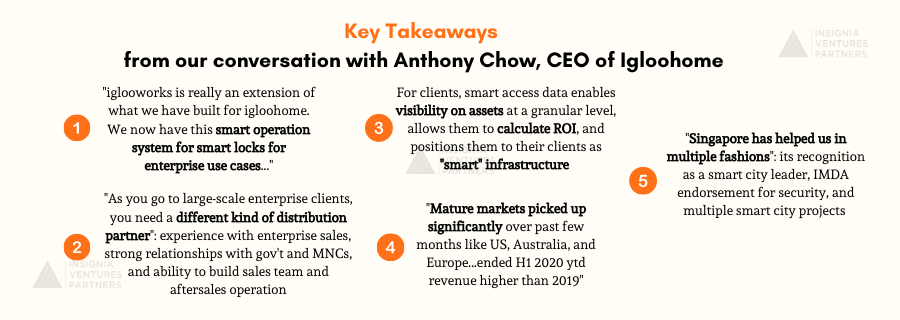
Key Takeaways from our conversation with Anthony Chow, CEO of igloohome
About our guest
Prior to co-founding igloohome, Anthony Chow led data science teams in developing proprietary personalization engines for Singtel’s Group Digital Life unit. This extensive data science experience and expertise have been critical to Igloohome’s engineering and data-driven approach to growth across 100 countries globally.
Anthony holds an Electrical and Electronics Engineering degree from Imperial College London and a Master’s in Management Science and Engineering from Stanford University. He was also an Infocomm Development Authority of Singapore scholar.
Timestamps
00:58 How Yinglan and Anthony met;
03:10 reception at igloohome conference for distributors 2019 and 2020;
07:17 major milestones of igloohome in the last five years;
09:18 the genesis of iglooworks and four case studies;
16:23 outlook on iglooworks and their enterprise distribution approach;
20:46 data collection and importance of data to clients;
25:45 the impact of COVID on their various markets;
28:08 how Singapore’s smart city initiatives have been pivotal to their growth;
31:55 Anthony’s favorite books, apps, and igloohome product;
Transcript
Paulo: Welcome everyone. To on call with insignia, where we go on call with Southeast Asia’s emerging technology, startup leaders and investors. Today, we’re stepping into the world of smart locks and cities with Anthony Chow CEO, and co-founder of smart access solutions company igloohome
With the crisis accelerating digital adoption, the immediate impact of COVID-19 on smart homes and smart city spending may have been negative, but market researchers expect a long term growth in terms of adoption.
And igloohome has been at the forefront of driving adoption for smart access solutions selling over a hundred thousand smart locks in over a hundred countries.
They’ve also recently launched smart access management for enterprise through igloo works. And just last month, they celebrated five years of creating a world without keys. So in this episode, England and Anthony, you will be taking stock of these past five years and exchanging ideas on what the next five years and beyond hold for the company,
Yinglan: Hi everyone. And thanks Paulo for the intro. Welcome to On Call with Insignia. The story behind our investment in igloohome is one I often tell, and I [have] known Anthony for a long time before, he even started igloohome. I was invited to guest judge at a Singtel innovation competition that they held many years ago, actually.
And, one of the finalists was Anthony, and it was even pre-igloohome days. And he won the first prize of their competition and the prize for that award was to actually spend a few months in an incubator in the US and he went there and he got [so many] clues about starting a company that he came back and wanted to start igloohome.
Now, the interesting complication is that he took the government scholarship to study, from Singtel, and to make that happen we had to come up with some interesting arrangement with Singtel to convert that part of the scholarship into shares in igloohome and serendipitously, a few years later, I bumped into Anthony again, and I genuinely needed a smart lock for my house.
So, I said, “Hey, I do need a smart lock in my house. I wanted to kick some tires on his product. So I invited Anthony and his team to install one in my home. and I saw how dedicated they were to their customers’ needs. Anthony actually spent a few hours in my house, because I was trying to configure it with some interesting configuration with Alexa home and you know, that some switches. And it’s this dedication that I believe that has helped them go to where they are today.
So, fast forward a few years from when he was still an employee at Singtel to now a CEO, running a more than a hundred people company. We get to hear from Anthony himself today. It’s been our privilege to partner with Anthony and igloohome, and Anthony, welcome to the show.
Anthony: It’s been a great journey with Insignia and I think really good memories. All the days from Singtel, when we first met you all the way until starting the company and having Insignia lead our first Series A round back in 2018. It’s been a great journey. Thank you for your support.
Yinglan: We are delighted to be partners. The other thing I wanted to commend Anthony about is that, I mean we’ve seen entrepreneurs in the US launch big conferences but Anthony is one of the pioneers in Singapore who has launched the iglooCon, and he actually not only had a great turnout and some great speakers, but also, is now a real thought leader in smart cities and smart homes in the region, and you recently had your annual iglooCon virtually. And I wanted to let you tell the audience how it was, and also talk about the past iglooCon you have organized.
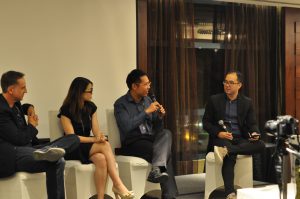
Yinglan (3rd from the left) on panel moderated by Anthony (rightmost) at iglooCon 2019
Anthony: Thanks. Yeah. So, iglooCon was an initiative that we put together for the first time last year. So last year was basically our fourth year anniversary. And over the past couple of years, we really have built up a very strong distribution network around the world. Across more than a hundred different countries.
And at a point last year, we had about 60 or 70 distributors supplying our products globally across 15 different languages. So we always thought if we want to become big like Apple, the Amazons, we need to make sure that we build very, very strong and tightly-knitted distribution partnerships so that they don’t see themselves as just partners, but as extended teams within igloohome.
And so we thought it was a very good idea to bring all of them to Singapore, run our very first igloohome conference. We should call it iglooCon and get everybody excited about what the future holds for igloohome. So the first time we ran it was last year in August, 2019.
And since we were all running this show in Singapore and Singapore being one of the forerunners of smart cities in the region, and in many parts of the world, we thought it would be nice to also run a Smart City Summit, where, while the distributors and our partners are in Singapore, we can also showcase some of the work that are working on smart cities in Singapore and get all of them inspired to bring these ideas back to their respective countries. We have the igloohome products and so that they can also propagate the smart cities initiatives that we want to work on globally.
So we ran iglooCon last year for the first time. You know, we have almost no budget. But I think we put together a very good show, across two different locations in PLQ in Paya Lebar and in JW Marriott for the grand day where we had over 300 attendees of smart cities practitioners come to Singapore and share their ideas about smart cities and some of the work they are working with igloohome on as well in their respective region and countries, as well as, verticals.
So it went really well. We had a lot of great support from governments. We even had, one of the governments from Africa, one of the South African mayors came down to attend the event. We were very pleasantly surprised and it was supported by Enterprise Singapore and IMDA last year. So, because of such a great success last year we wanted to replicate this again, this year and make it an annual event.
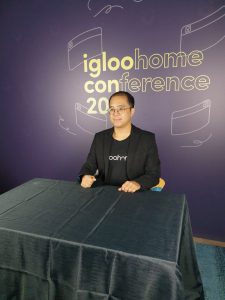
Anthony on live video setup of iglooCon 2020 which was done virtually
But of course, as everyone here knows, nobody knew what kind of year this year would turn to be with COVID and the pandemic raging all around us, we couldn’t do it physically, even though we kept delaying the date. Just really in March and April we say that there’s no way we’re going to do this physically. We’re going to run it virtually. So the team came together and we transformed a part of our office into a live view, like in Chinese they call it zhibo right?
So basically live streaming, live streaming straight from our office here. We had lights and cameras and Zoom and many of these other virtual platforms. And so we ran iglooCon 2020 this year and at the same time we celebrated our fifth year anniversary. The great thing about this year is that because not all our distributors could visit us in Singapore last year, this year we could reach out to every single one of them, they could all call in and get from us the latest and greatest of igloohome products that we are launching, over the next couple of months. And at the same time, we could get all our distributors to share some of the most exciting business opportunities that they have seen that have come out from the COVID-19 pandemic.
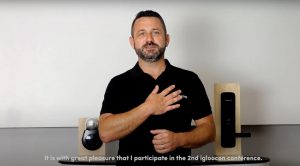
iglooCon 2020 participants from all over the world
We had our partners from the US share some of the most exciting things happening in the US to our partners in Australia. Our guys in China were just sharing openly about some business opportunity they’re working on. And it was a very, very good three days that our distributors and partners spent together. And we ended off with a fifth-anniversary celebration, so everything was online but we managed to ship a fifth-year anniversary champagne bottle all around the world.
So we had a champagne session together and I think it was great. I think we also are very happy that all our igloohomies, you know, our staff from about 30 different locations around the world, 130 of them were able to call in and experience this together with our partners. And, it was a very, very strong rapport and team-building event. So we will do it again next year and we would like to invite more people to join us, third iglooCon in 2021.
Yinglan: Time flies. This has been five fantastic years for igloohome. Can you talk about how you went from installing your first lock and now crossing over 100,000 locks sold about the milestones of igloohome and how it has gone from your first lock installed to where it is now today.
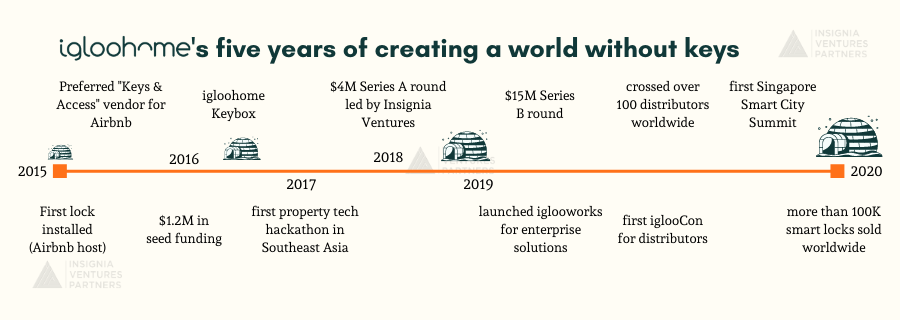
igloohome’s five years of creating a world without keys
Anthony: Sure definitely. Like you said, five years really go by very quickly. You know, one thing that I always tell myself is when you’re running a startup or running a lot of complicated things, the days are long, but the years are very short. You know, in a day you can handle so many problems, but when you look back five years, just go by.
I remember back in 2015, when we started the company, we were a group of four people. Today we are about 130 across 13 different regional locations with over a hundred distribution partners globally, supporting more than 15 different languages, around the world. We started out very closely in the vacation rental market because we felt that there was a very, very good niche market that we could target, which is the Airbnb community, helping them manage their check-ins in a much easier fashion and helping them scale up their Airbnb properties easily, by giving them a great keyless access solution. But as you progress along, we started our new vertical, which is our B2B vertical where we are focusing on commercial real estate and enterprise customers where we launched our new brand called iglooworks, which was launched last year.
So, right now we are covering a lot more ground on different opportunities that require access control and smart locks. And, from the first day when we installed our very first back in Philadelphia, in a depth of the winter back in late 2015, — that one we spent almost 12 hours trying to get our first lock installed, and of course to install a lock for 12 hours is definitely not a viable business model. So we had to figure out how to scale that up to make it a lot more efficient, eventually, we got so many Airbnb hosts liking our products that we eventually got an official endorsement from Airbnb, back in late 2016. and as we launched the iglooworks now we are crossing over a hundred thousand locks sold and growing very quickly.
It really has been a ride, you know, over the past five years.
Yinglan: Very impressed by the journey so far. One of the milestones that I’d like to talk about is your launch of iglooworks. It’s been almost a year now. I’d love to hear about the progress and for you to share this, and that’s about how it has fared in terms of servicing large scale infrastructure and how you have reshaped the IoT space and what are some of the interesting use cases here you have encountered.
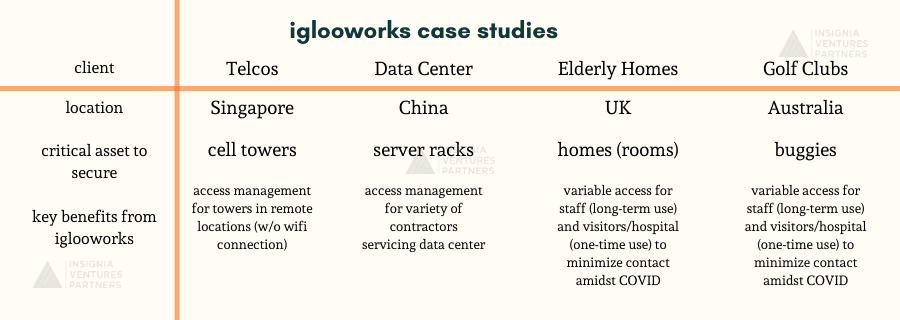
iglooworks case studies
Anthony: Definitely I think, to talk about iglooworks, we need to rewind two years back when one of the key technology innovation that we really provided into this access control world was really designing smart locks that could work completely without the need for internet connection.
So this is basically a smart lock that you can put on your door. And without the need for an active wifi connection, you’re able to remotely grant access for somebody to access the property. And this was great for the Airbnb community and the vacation rental market because, in the vacation rental world, you sometimes don’t have good wifi, especially in the properties in the mountains or by the beach, or if it’s in a basement; many properties in Europe don’t get a very strong wifi connection. And the last thing you want is that when a guest checks in, the wifi breaks, or you don’t have strong wifi and the guests get locked out.
So with this technology, we call it the algoPin technology using systems like cryptography algorithm, very much like how banking tokens work. That enables us to set a new code for every single time a guest visits. This set us apart in the vacation rental market. And as we scaled, we realized that the enterprise space is a huge opportunity for us to go into, because many of the cryptography algorithms and the security that we designed and developed can be very helpful for a large-scale enterprise trying to manage their infrastructure, which is very much distributed across the whole country.
So some examples that we started looking at were really in the telco space because of my background from Singtel. And Singtel Innov8 being one of our shareholders. Telcos manage a lot of cell towers and network infrastructure that’s distributed across the entire country.
And many of these installations don’t come with an active wifi connection because they are just in remote parts of the country. In Singapore, there might be several thousands of these cell towers sitting around the entire country setting up the 4G network. But if you go to just a bigger country like South Korea, they have over 800,000 cell towers covering the 4G and upcoming 5G networks over in South Korea.
And over in the US, you’re talking about millions and billions of these cell towers covering the whole country. So to manage access to all these installations, it’s a very big pain point. The infrastructure management team or the operations team will need to manage volumes of physical keys and maintain a set of many, many different contractors.
And whenever the contractor needs to go and service a cell tower, they need to go to a central location, fill in a form, draw the key, drive to the remote site, access the site with the key and sometimes if they take the wrong key that’s a very big problem because they got to drive back and exchange the key.
The worst thing is that the physical keys do not have audit trails. They have no idea how often the person has gone in or if the keys have been duplicated and, these kinds of things do happen. And it’s very very challenging because you’re kind of managing critical infrastructure.
So, with the telcos kind of backing us on our cap table and we started having this communication with them in 2018, early 2019, we very quickly realized that this is a very big opportunity for igloohome to go into, with the technology that we have built and the platform that we have designed, very well fit for distributed asset management for high critical infrastructure.
So telcos became one of our first testing ground for our enterprise products. And we very quickly branched into utilities, where the water, electricity, gas infrastructure across countries also face the same problems as telcos. Because they have pump rooms that are distributed across the country. They have gas rooms, utility rooms, switch rooms, substations that are covering the entire country and all require this complicated, physical key access kind of system, today is very untenable as we scale up into the smart city space, into the future.
So iglooworks is really an extension of what we have built for igloohome. We now have this smart operating system for smart locks for enterprise use cases, which includes enterprise-grade hardware, enterprise-grade locks, through highly, secure kind of backend system together with encrypted communication protocols that we’re using for real-time communication, between the locks, as well as the servers.
At the same time, all the data is all flown to an enterprise access management dashboard, where the operator can easily manage everything on a single dashboard from granting access to the ad hoc contractors, to their own staff, to knowing anything that might have gone wrong with the lock.
So we launched this last year on the back of our $15 million fundraise that was closed last July. And from there, we have really been getting a lot of great traction in the market and trials that have been ongoing with many of these enterprise clients.
What I can share are some very interesting use cases. One of them was really an opportunity that we are working on in China where it’s a large data center client. And many of these data centers have co-located several racks within the data center and today using physical keys is also very challenging.
What we’ve been doing is providing our iglooworks solution. We have the enterprise hardware. We have a dashboard and encrypted connectivity, which allows them to now grant access easily to any of their contractors or clients to really visit the data center and just go in and manage or do servicing on their server racks very easily.
And, with servers, which are very high critical infrastructure, this kind of immediate access and visibility into who’s going in is very important to the data center operator that we’re working with over in China.
There are some other interesting use cases they already have come about, during this COVID, there’s this huge elderly homes service provider over in Europe. They manage tens of thousands of homes where they have the elderly folks, who are staying there.
Some of them might be staying in by themselves and they have all this service staff that really goes there to drop off food or medicine on a regular basis. So the service staff similarly is going somewhere to draw the physical key to go. But with the iglooworks solution, they can easily just grant access, go in, drop the medicine, drop the food and leave and you now have all these access records all stored in a central location so that this can be shared with the families or if there’s a need to call like an ambulance or one of these hospitals staff to come and visit and they can easily grant one-time access without needing to pass the key or kick down the door which they have been doing previously.
I’ll just share one more before we move on to the next question. In Australia, all the golf courses have many buggies, right?
Maybe in a golf course, you might be managing a few hundred buggies. And in the entire Australia there might be several, maybe 50,000 buggies that go around on a regular basis for all the golf courses that you have. So today similarly, all the buggies, all the keys are also in the clubhouse. And because of the COVID situation, they want to minimize contact.
So right now they’re actually putting an iglooworks keybox onto every buggy so that whenever someone buys an 18-hole or nine holes, they can go there when the buggy takes the key and drives the buggy without actually needing to go to draw the physical key from the clubhouse. Many interesting use cases have really popped up since we launched iglooworks.
Yinglan: That’s a great development. And I noticed that you had done interviews with CNBC towards the end of last year. And mentioned that you expected iglooworks to take up maybe 50 to 70% of the business. So I think this is a great development, and I wanted to check back in on what is the outlook on the business now?
What were some of the challenges, I guess, in growing iglooworks, and what have you learned growing this side of the business?
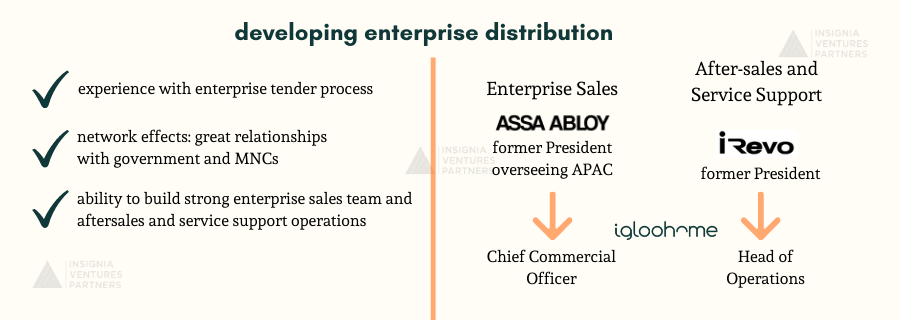
developing enterprise distribution for iglooworks
Anthony: I think the outlook hasn’t changed, we are expecting iglooworks to start taking a big chunk of our revenue or contribute to a big chunk of our revenue in the next 12 to 18 months. So as we went into this year with our original kind of projections we did not project for COVID as with many companies.
And so we actually faced slow down in the first half of this year. Well, what was very promising and also very uplifting to us is really during the COVID period, many more interesting opportunities really came out and we also helped to accelerate the digital transformation of many of our enterprise clients that we were talking to about iglooworks in the pre-COVID world.
In fact, many of them are saying that in the post-COVID world smart access for them becomes of paramount importance. They’re going to need to go contactless. They need to have audit trails. They need to have contact tracing. And a smart lock, or at least a smart access product for all their assets, becomes very important for them to achieve all these things, in a world where we live with COVID.
The examples that I should just now, even we have no idea that elderly homes or like golf clubs and stuff like that will really reach out to us proactively and say that, “Hey, we need the iglooworks solution today. You know where previously it might not really be needed, but now it is a requirement.”
So we find that, you know actually COVID does help the acceleration of the digital transformation of many of these enterprise clients. And at the same time during this period where we had a law in deployment because of a slow down in supply chain and also global shipping, at least in the first half of this year.
And we took the time to consolidate our foundation — to make it strong for enterprise sales and distribution and aftersales service support. Enterprise sales is difficult. In the first three years of our company, we were very focused on working with distribution partners that have very strong retail reach and after-sales service support for the consumer market, like the individual Airbnb hosts or like the individual home that wants to rent out their house.
But as you go to large-scale enterprise clients, you need a different sort of distribution partners. We need partners that are very strong in the enterprise tender process, you need to have great relationships with system integrators. They have great relationships with the government as far as large MNCs and have sold to these clients before because many of it is all about relationships and also trying to sell them the vision that we are providing them with a solution and also help them grow their business at the same time.
So it was a different style of distributor that we need to acquire. And so we started acquiring these distributors starting in the second half of this year and going into the early part of this year. And we managed to build up these six to seven great enterprise distribution partners in the past 12 months. And that really helped to accelerate some of our iglooworks deals that we were working on.
The second thing that I really want to highlight is you also need a very strong enterprise sales team within the company, right? Similarly, before that, we were really working with the retail consumer, SME kind of sales, but as we went into enterprise sales, we started bringing on individuals from the industry that knows how to do enterprise sales to join the company.
So we have brought in leaders from the large enterprise competitors, such as Assa Abloy, which is the largest lock player in the global market, listed on the Swedish stock exchange over $20 billion in market cap. And the president of Assa Abloy looking after the Asia Pacific actually joined us to take on our chief commercial officer role.
And he’s really building up a great enterprise sales team within the organization. And also, the past couple of months after you do the sales, you also need to provide a scalable supply chain and aftersales service support and to that end, we also brought in a very strong leader in the lock space as well.
If you know of the Samsung locks, the Gateman locks, Gateman is really run by this company called Irevo. And the president of the company Irevo just joined us to head up operations for us within the organization.
He’s able to help now provide great support for enterprise clients in terms of scalability of the supply chain, which is super important right now, looking at the disruptions that we are facing on the supply chain. And he knows how to navigate the situation.
And so with these kinds of leaders and a couple of others who will join us as well, we built up a foundation to tackle the opportunities that iglooworks has set up to tackle. And I think we’re in a much better position today, post the funding from last year. And we really are set up to achieve many of the goals that we want to do.
Yinglan: That’s fantastic. One of the big trends that we’re seeing is the whole IoT space booming during the COVID situation and connectivity data and like intelligent data. I think it’s very important for your iglooworks smart access solution. So I’d love for you to explain to our listeners what kind of data you’re collecting and how strategic it is for the enterprise.
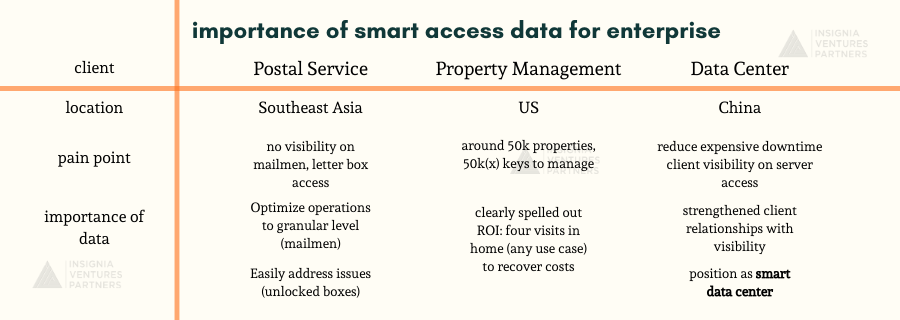
importance of smart access data for enterprise
Anthony: For us, this is very important to our client and it’s also one of the big reasons why many enterprise clients choose the iglooworks solution. The first thing is really, they’re very interested in having transparency in the data and the audit shows that we provide them whenever we install a smart lock. For them now they have a way to actually know who is going in and going out.
And these are very important data and I’ll share some examples later on and this information will enable them to make better decisions on what kind of contractors to work with, how often that installation requires servicing and also give them a way to calculate the ROI compared to previously where they were really passing physical keys around, which cost a lot more money because of travelling, and passing keys around to what we are doing today, which is just a straight route to the installation. You get access and go in.
The second thing really is around peace of mind. This is a little bit less tangible, but actually knowing that you have provided access, which is time-bound just for the one hour or for the 30 minutes for the right person to access, actually provides a very strong peace of mind and security.
I think the other very important strategic data that we provide is preemptive alerts whenever someone is actually tampering with the lock. Once again, many of these installations are high critical infrastructure. When somebody is tampering with the lock, we are able to provide preemptive alerts to say that, “Hey, something’s wrong with this lock here, you might want to send someone down to go and visit it,” or even something as simple as, “The door has not been locked properly,” we can also send an alert so somebody can go in there to close the door and lock it up properly.
Let me give some concrete examples so that you kind of understand how these data can be used and why it is so important to them.
The first one I would like to share is really a large postal service that we are working with, right now, in Southeast Asia. They maintain all these letterboxes and pop boxes around the country. And today, one of the biggest problems that they have is they have no idea when the mailman has gone there to drop off the letters, how fast the mailman takes to drop the letters off.
And also the worst situation is if the mailman has forgotten to close the letterbox many of the confidential letters might be at risk of being taken away. And this really causes big trouble for the organization’s reputation.
In this work that we have done with them, we really fit up our iglooworks solution, providing a way for them to grant access only when the mailman is there to open the letterbox and also close it and also let the company know, how often and how long this mailman is required to be there, to be able to drop off the letters.
And the results were very interesting. We were able to show them the scatter plot of how often the mailman was there and which mailman actually did a better job than others. This is information that the operation team can dig into and find out if certain mailmen need further training to improve efficiencies. We will also be able to show them if a mailman has forgotten to lock the letterbox after 30 minutes. We can preemptively send an alert and a mailman will be triggered to go down there and close it before residents come and see it and give a complaint.
So these are very simple things, but I think it provides visibility into the deliveries of letters that the postal service has never had the visibility on before.
Another one I want to share is really a large property management company that we’re working with in the US. They manage more than 50,000 properties and they have many operations that they need to do on a regular basis from viewing of the property to renting out the property or even to send maintenance staff and this entire workflow is actually very complicated because you can imagine 50,000 properties, they must have hundred thousand keys, at least that they’re managing, you know, in a distributed way across the country in the US.
What we have done with them is really build access into their workflow, automate the pin generation for them so that they are able to generate one-time access or duration access for every contractor, operator or prospective buyer or tenant that they need access to, and really be part of the entire operations of key exchange.
And I think what is very interesting is that the ROI was very clearly spelt out in this work that we did with them. They told us that, just four visits whether it is a plumber, electrician, just four visits, they can cover the cost of setting up one of the properties with iglooworks solution. And this is very easily recoverable, within less than a month for four visits and the entire ROI covered for the iglooworks solution.
And the last one I would just want to highlight really is, you know, back to an example I shared just now, which was the data center operator over in China. They want to reduce expensive downtimes, especially to do with the servers going down. These are all crucial things for businesses and, because they are managing the servers for their clients, they need to know and show their client where the contractor is accessing when the contractor is not supposed to access.
And it also becomes a great value and vision that this operator can sell to their clients saying that they now have a spot data center. Their server racks are a lot more secure now because of the solutions that they have chosen to partner iglooworks on.
Yinglan: That’s fantastic. I see that Thailand has been your fastest-growing market and distribution in your line of business is of paramount importance. So I wanted to check in on how that has changed because of COVID and what you see are the opportunities that you can capitalize on with the supply chain disruption going on globally?
Anthony: On the distribution side I think the company is really built based on distribution.
We have both sets of distribution. One is the B2C, B2B2C distributors. You know, where they have dealers, they have network partnerships across the country and they are box movers. And then we have our enterprise distributors where they are able to work with system integrators. They are able to bring stock in, they are able to provide pilots, POCs, et cetera, before they go out to full-scale deployment and after-sales service support.
Today, Thailand still remains one of our strongest markets across Southeast Asia. But with the COVID hitting early on this year, during the height of the COVID, one thing that we did not expect was, how fast enterprise customers were able to move in much more mature markets, such as in the US or even in Australia.
In the first half of this year, our USA market actually took off very quickly and very fast, and many of these large-scale property management company and logistics players, or even like vacation rentals, even though there was a slow down, when the uptime come again, they will be able to operate very quickly back at maximum capacity and maximum efficiencies.
This is especially so for the infrastructure management companies, which we started working with very quickly, because they really need to deploy a solution to enable them to go contactless and have contact tracing, to know which deliveries are happening, and enable them to scale up the business much more quickly rather than keep adding manpower to manage the physical keys.
And, today as we scale up, while last year, about 60% distribution is in APAC, today that number has been shifted slightly. The mature markets have really picked up quite significantly over the past couple months, especially over the US, Australia, Europe, and in Southeast Asia, we are kind of seeing really a slow down in the businesses, especially in markets like Indonesia and Malaysia, there was really a slow down for the business, but overall, because of the offset, we are actually much more bullish of the company at this stage where, we ended the first half of this year, year-to-date, our revenue higher than the last year.
So that’s positive news for us going into the second half of this year.
Yinglan: Great and I think you are hitting on the sweet spot of one of the global trends, which is the smart access and the rising trend of smart cities.
I believe that smart access is the foundation of smart cities and in your hometown, Singapore, I mean, we were one of the biggest spenders on smart cities in the world last year. And we also ranked one of the top smart cities globally. And I think igloohome is very well-positioned, but I would love for you to share with the audience how has that helped igloohome as a smart access solutions company, and what you are doing in other parts of the world.
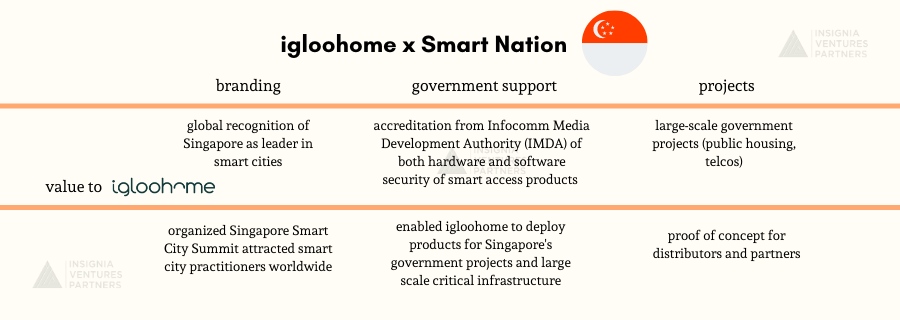
igloohome and Smart Nation Singapore collaboration
Anthony: Sure, definitely. I think smart access, like you said, is really the foundation of smart cities because, no matter what, everybody needs to grant access to someone to access anything in the city, whether is it a pump room, is it a switch room or is it a building or in your home, and, with many of this properties and infrastructure guys trying to digitize the entire workflow, smart access becomes a very crucial component of this entire digitalization of the workflow, because you don’t want to have everything on the cloud, but yet you still need to pass them the physical key to go into the asset to do maintenance or to do any work on it, kind of defeats the purpose.
So bringing this entire physical access online is what we do at igloohome and iglooworks and what we will continue to do moving forward.
Read more on why smart access is foundational to smart cities >>>
Being in Singapore has a lot of perks. We relocated [headquarters] to Singapore about three years ago and we really have been riding the whole brand of Singapore around innovation and smart cities over the past couple years.
You know, one of the most interesting things that we have done last year was actually to start working with many of the government agencies, to look at how we can help them digitize access for many of their access requirements. And to do that, we partner with IMDA. So IMDA provided us with accreditation of the security of both hardware and software of our smart access products that allow it to be deployable into government projects as well as large scale critical infrastructure in Singapore.
And that really has helped us a lot, with IMDA’s backing, we started working on trials, with many of these large-scale government agencies, like the public housing of Singapore, where they needed a solution to help contractors grant access to the rooftops to manage the base stations, to the ground floor to manage the switch rooms, the lift control room, et cetera, or to telcos within Singapore where they have all these cell towers where they also need a smart access solution to enable the contractors to go in to do maintenance.
So while the scale is already quite sizable, in the tens of thousands of products, which, brings a deal size to the millions, what I think was more interesting is that using Singapore as a testbed to trial products and then having our partners duplicate or bring these ideas back to their respective hometown and home country, and work with their agencies, work with their governments, and work with their infrastructure MNCs to really scale up in much bigger opportunities within their country.
So one of the things that we did was — and at the start of the conversation today we talked about iglooCon 2019 last year. So that was why we really pushed forward, launching our conference for the first time, in Singapore, where all the partners around the world, we invited them to Singapore so that they actually can see in action, and they can understand how the government agencies and public MNCs have been using our solutions to manage infrastructure.
And so when you visit all these, their eyes light up. Many of them come and tell me, especially all the USA partners they say, “Oh, you know, Anthony, you guys are looking at a total opportunity of maybe a few thousand cell towers in Singapore. You know, guess what, Tower America in the US has more than a million cell towers they are managing, probably also facing similar problems and they got so excited to bring this opportunity and ideas back to their respective countries and get into their respective trials.
So Singapore, I think has really helped us in multiple fashions. You know, one is the brand recognition of Singapore as being a leader in smart cities.
If Singapore is keen to try iglooworks, many of the other countries will also be keen to try it. Secondly, having an endorsement from IMDA, the Infocomm Media Development Authority of Singapore, about the cybersecurity standards that we put into our software, as well as the hardware security that we put in, and the innovation we put behind our product is also this a very endorsement for the regional players to adopt our solutions as well. And finding the use cases, getting the trials going very quickly and enabling our partners around the world to see it in action, really helped us leapfrog and also accelerate the adoption of our solutions beyond Singapore.
Yinglan: Definitely looking forward to more of these smart city initiatives igloohome will be leading. So to wrap things up, we always ask our guests to share some of their favorite things in our rapid-fire question round.
What is your favorite book on entrepreneurship?
Lee Kwan Yew’s From Third World to First
What app do you use the most nowadays that you think not many people use?
Aurora / Garmin Connect
What is your favorite, go-to destination in Southeast Asia?
Bali (igloohome has dev teams here!)
What is your favorite igloohome product?
igloohome Keybox
Yinglan: My favorite igloohome product is the one you personally installed at my home back then — which we still use today.
Thank you, Anthony, for going on On Call with us today. Once again I’d like to congratulate you and your team for five years of creating a world without keys and it’s been a pleasure to have been part of this journey early on. Excited to see what new milestones igloohome will be able to achieve in the next five years and beyond!
Paulo: To all our listeners, stay on the line and connect with us. Follow us on Spotify, Apple Podcasts, Waves, and wherever you listen to your podcasts. Until our next call, this has been On Call with Insignia Ventures.